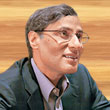“no question about that”
2016/10/04 08:41:37 網誌分類: 生活
| Financial Secretary John Tsang Chun-wah is a fluent English speaker. No question about that. He spent his early life in the United States. He holds degrees from the Massachusetts Institute of Technology, Harvard, and Boston State College, where he studied bilingual education. He worked for Boston Public Schools before returning to Hong Kong in 1982. Two weeks ago, he sat next to his boss, Chief Executive Leung Chun-ying, at a press conference about the Wang Chau public housing project controversy. Many government officials, politicians, and reporters know there is a?rift?between these two men. A rift?used this way means a serious break or split in friendly relations between two sides. For example, there is a?rift?between newly-elected Philippines President Rodrigo Duterte and US President Barack Obama. Tsang Chun-wah may compete against his boss at next March’s chief executive election. A reporter asked him during the press conference if he agreed with his boss about building the Wang Chau housing project in stages. He replied: “You asked me whether I agree with my boss. You always agree with your boss. No question about that.” The expression “no question about that” is used when you want to make clear that something is definitely true or certain. It is similar to the expression “no doubt about it”. Some newspaper columnists and radio show hosts have said Tsang Chun-wah was not referring to himself when he gave that answer because he said “you” instead of “I”. These people are talking nonsense. It shows they are not fluent English speakers. Many friends of mine whose first language is English laughed when I told them some people in the media claimed Tsang Chun-wah was not referring to himself because he had said “you”. I do not know if Tsang Chun-wah really agrees with his boss but I can assure you it is grammatically correct and very common to say “you” instead of “I” if someone asks you whether you agree with your boss, or if you wash your hands after using the toilet. * * * 財政司司長曾俊華能操流利英語,這是毫無疑問的(No question about that)。他早年在美國居住,於麻省理工及哈佛大學取得學位,在波士頓州立學院取得雙語教育碩士。他於1982年回港前在波士頓的公立學校工作。兩星期前,在橫洲公屋計劃爭議的記者招待會上,他坐在他老闆即特首梁振英的旁邊。許多政府官員、政客和記者都知道,這兩個人中間有嫌隙(rift)。A rift在這裏解作在雙方的友好關係之間存有嚴重的分歧或裂縫。譬如,新當選的菲律賓總統杜特爾特與美國總統奧巴馬之間,就有很大的嫌隙(rift)。 曾俊華或許會在下年三月的特首選舉中,與他的老闆競爭。一位記者在記招上問他,橫洲公屋計劃按不同階段發展,他是否同意他老闆的決定。他回應道:「你問我是否同意我的老闆。你永遠同意你的老闆,No question about that.」當你想強調某事是確切和肯定的,你便可用習語No question about that,它跟習語“no doubt about it”的意思相近。有些報紙專欄作家和電台主持說,曾俊華並非指他自己,因為他答問題時用的是「你」而非「我」──這些人真是胡說八道。這只證明了他們都不是說流利英語的人。 當我告訴那些以英語為母語的朋友,傳媒中有些人聲稱曾俊華並非指他自己,因為他說的是「你」,他們都失笑了。我不知道曾俊華是否真的同意他的老闆,但我可以向你保證,若有人問你是否同意你的老闆,又或你如廁後有否洗手,在回應中用「你」而非「我」絕對文法正確,而且非常普遍。 *你只須用手機掃描 QR code,就可以聆聽我朗讀專欄的錄音。希望這能幫助大家改善英文字詞的發音。mickchug@gmail.com 中譯:七刻 中譯:七刻 Michael Chugani 褚簡寧 |
 | |
回應 (0)
我要發表

